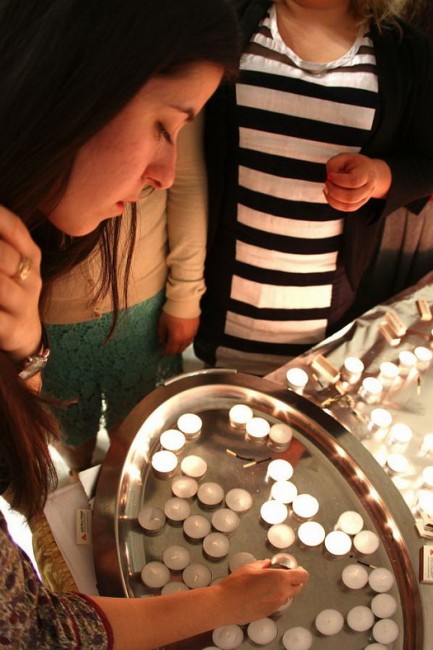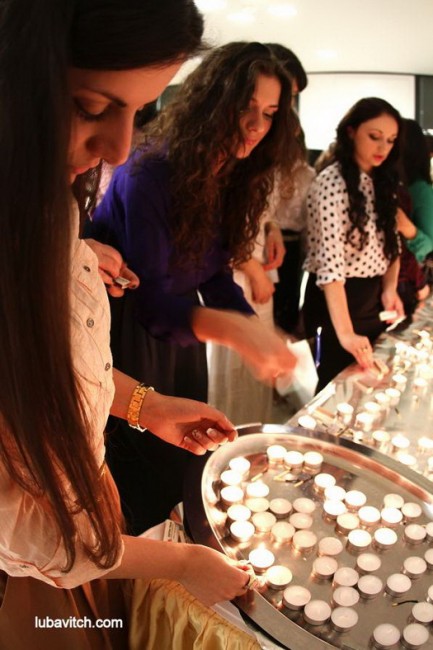
Jewish Revival Gains Ground With Russia’s Students
Mikhail Runkin, a 26 year old university student from Yekaterinburg Russia, was nervous. He hadn’t imagined that he’d share one of life’s intimate milestones in a public setting. But on a recent Friday night, as he celebrated Shabbat dinner with 300 students, rabbis and lecturers, including the Chief Rabbi of Russia, Rabbi Berel Lazar, Mikhail was focused on one individual, a girl he’d met only a few months earlier. Unannounced, he stood up on his chair in the middle of the meal and proposed to Shaina Katzinova. Shaina accepted, and the entire room erupted into jubilant cheering and shouts of “Mazal Tov!”
Mikhail and Shaina were on a tour of Jewish Europe with students hailing from 16 Russian cities. They had all been part of a Jewish studies program led by their local Chabad rabbis for a period of six months in preparation for this trip. It was at one of these weekly Jewish classes that Mikhail and Shaina had originally met, and for them the trip represented not only a commitment to a Jewish lifestyle and identity, but to a Jewish future together.
Discovering Community, Belonging
Organized by the Federation of Jewish Communities of Russia, and co-sponsored by Or Avner and Ner L’elef, the Jewish tour of Europe was offered to 18-26 year old college students who committed to an 8-month course of Judaic study with their local Chabad rabbi. From May 5th- May 12th they visited Italy, Slovakia and Poland, meeting with Jewish leaders and visiting Jewish landmarks.
Apart from the historic and Jewish enrichment the students gained on the tour, meeting other students on a similar journey of Jewish discovery, and exploring Jewish communities in Europe, were profoundly eye-opening for them. This was especially true for many who live in isolated cities scattered throughout Russia where there is minimal Jewish infrastructure.
Miriam Krayeva, 21, a college student from Samara, Russia, is studying design at the Samara Art Academy. “I’ve never been in a place with 300 other Jewish people. Sometimes my friends and I had a feeling that we are a small little group alone in the word and that there weren’t a lot of Jews. We thought ‘If I can’t find a Jewish guy, I’ll just marry a nice non-Jewish guy.’ There’s so few of us anyways.”
Rabbi Zalman Deitch who led a group of students from his city of Perm, Russia, observed the impact: “The students who came to learn with me during the year joined the program hoping to learn more, meet more Jews and go on a fun trip. But they came away with an appreciation for the bigger picture and their role in it: they now understand that they are a part of a movement of young Jewish adults who are, quite simply, the future of Russian Jewry. They are inspired to step up to the plate and play their role proudly.”
Searching for Identity, Meaning
Rabbi Mendy Wilansky is the Moscow-based coordinator of the “EuroSTARS” initiative in the former Soviet Union. The energetic 28-year-old, originally from Elizabeth, New Jersey, moved to Russia two years ago to run programs and projects geared to Jewish college and university students with little-to-no Jewish education. Word of the newly developed study-and-tour program spread quickly with the help of Shluchim using popular Russian social media sites like VKontakte, Whatsapp and Facebook.
From Rostov to Perm to Moscow to Orenberg, in cities both big and small, hundreds of students signed up for months of serious learning. In some cities it proved to be a dramatic revival.
“There was nothing going on Jewish-wise for these students,” says Wilansky. “Suddenly this program comes along and they are involved and interested. These are bright, driven young students whose parents grew up under communism and never spoke about anything Jewish. Given this opportunity they are taking back their identity.”
Taking steps towards adopting a Jewish lifestyle seemed to be very much on the minds of many students who developed mutual connections based on Torah study and Jewish discovery over the course of the trip.
According to Wilansky, the exposure to Jewish life beyond the very small confines of their respective communities helped students like Miriam recognize both the feasibility and relevance of living Jewishly. “Our Chabad rabbis create a very close connection with the students. But knowing only their one rabbi, living what seems to be an antiquated, religious lifestyle, makes it seem an anomaly in the real world. Given the opportunity to meet hundreds of others interested in this lifestyle, and visiting other thriving Jewish centers where Judaism is very much alive and well—this is transformative.”
Students were accomodated by Russian-language tours of the Coliseum, the leaning tower of Pisa and Venice’s gondolas, a tour of the old Jewish ghettos and historic synagogues. They met with local Italian Chabad shluchim and then traveled to Bratislava, Slovakia where they spent a grand Shabbat before going on to Poland’s concentration camps, Aushwitz and Birkenau. That too, resonated differently for the students as a result of the study program they participated in prior to the trip.
Taking Ownership
Says Miriam, “It was my second time at the concentration camps, but this time it was a lot more meaningful. The first time I just remember being horrified. This time I had this overwhelming feeling that I need to do something about it. I have to marry a Jew and live a more meaningful life. I stood there and thought ‘if I don’t marry a Jewish boy what am I going to tell my children?’”
The rabbis who led their respective groups got similar feedback from most of the students. “Students have taken on countless mitzvahs, hundreds of women lit Shabbat candles, on Shabbat 20 took Jewish names, many of the men opted to have a brit milah, and dozens donned Tefillin,” Wilansky notes. “And perhaps the most important of all, many resolved to only marry Jewish, with quite a number—like Mihail and Shaina—becoming engaged!”
In a country where the intermarriage rate is estimated at between 80-90% this is a huge accomplishment.
Rabbi Yitzchok Garelik, brought 27 students with him on the trip from Kazan, Russia. Impressed by the kosher food and separate accommodations for the men and women, the students were met and greeted in each city by local Chabad shluchim, reminding them that they could always reach out to a local emissary for their Jewish needs, no matter where they find themselves.
“Until now, everything we were learning has been theoretical. On the trip suddenly they are eating kosher, keeping Shabbat, meeting potential Jewish suitors, every detail of the program has been planned with the specifications of a Torah observant Jew – they saw that you can really practically live this life and be a fulfilled person.”
He says his students also realize why Jewish engagement is critical. “They visited cities in Europe which once had large Jewish communities and that no longer exist. Places that used to be bastions of Torah, now barely have a minyan on Shabbat. They recognize that Russia is capable of falling into this trap and understand that they have a role to play in restoring Jewish life here. They want to be a part of this renewal of Jewish life.”

































